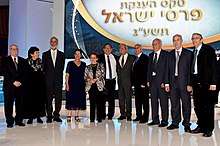Israel Prize
The Israel Prize (Hebrew: פרס ישראל; pras israél) is an award handed out by the State of Israel and regarded as the state's highest cultural honor.[1]
| Israel Prize | |
|---|---|
 | |
| Awarded for | Excellence in their field(s), or important contribution to Israeli culture and society |
| Country | Israel |
| Presented by | State of Israel |
| First awarded | 1953 |
| Website | cms.education.gov.il/EducationCMS/UNITS/PrasIsrael |
History
The Israel Prize is awarded annually, on Israeli Independence Day, in a state ceremony in Jerusalem, in the presence of the President, the Prime Minister, the Speaker of the Knesset (Israel's legislature), and the Supreme Court President. The prize was established in 1953 at the initiative of the Minister of Education Ben-Zion Dinor,[2] who himself went on to win the prize in 1958 and 1973.[3]
Awarding the prize
The prize is awarded in the following four areas, with the precise subfields changing from year to year in a cycle of 4 to 7 years, except for the last area, which is awarded annually:
- the humanities, social sciences, and Jewish studies
- the natural and exact sciences
- culture, arts, communication and sports
- lifetime achievement and exceptional contribution to the nation (since 1972)
The recipients of the prize are Israeli citizens or organizations who have displayed excellence in their field(s), or have contributed strongly to Israeli culture. The winners are selected by committees of judges, who pass on their recommendations to the Minister of Education. Prize winners are elected by ad-hoc committees, appointed by the minister of education for each category each year. Decisions of the committee must be unanimous. The prize money was NIS 75,000 as of 2008.
Recipients
Prominent winners include Shmuel Yosef Agnon, Martin Buber, Abba Eban, A. B. Yehoshua, Israel Aumann, Golda Meir, Amos Oz, Ephraim Kishon, Naomi Shemer, David Benvenisti, Leah Goldberg (posthumously) and Teddy Kollek, and organizations such as Israel Philharmonic Orchestra, Jewish Agency, Yad Vashem and Jewish National Fund. Though the prize is generally awarded to Israeli citizens only, in exceptional cases it can be awarded to non-Israelis who have held Israeli residency for many years. Zubin Mehta received a special award of the Israel Prize in 1991. Mehta is originally from India, and is music director of the Israel Philharmonic Orchestra.
Controversy
The decision to award the prize to specific individuals has sometimes led to impassioned political debate. In 1993, the opposition of then Prime Minister Yitzhak Rabin to the nomination of Yeshayahu Leibowitz led Leibowitz to decline the prize. In 2004, Education and Culture Minister Limor Livnat, sent the decision to award the prize to sculptor Yigal Tumarkin back to the prize committee. The decision was brought before the Supreme Court of Israel in the case of publicist Shmuel Shnitzer,[4] politician Shulamit Aloni, professor Zeev Sternhell[4] and Maccabi Tel Aviv basketball club chairman Shimon Mizrahi.[4]
In February 2015, Prime Minister Benyamin Netanyahu vetoed the appointment of two members of the selection panel for the Israel Prize in Literature, prompting the other three members, including Ziva Ben-Porat, to resign in protest.[5] Netanyahu explained that "[t]oo often, it seemed that the extreme panel members were bestowing the prizes on their friends".[6] One of the prize candidates Yigal Schwartz of Ben-Gurion University of the Negev withdrew his nomination and called on other candidates to do the same.[6] Over the next few days, members of the committees for the literary research and film prizes also resigned, leaving only two members of the original 13, and many other candidates withdrew their nominations.[7] David Grossman withdrew his candidature saying that "Netanyahu's move is a cynical and destructive ploy that violates the freedom of spirit, thought and creativity of Israel, and I refuse to cooperate with it".[7]
In popular culture
- In the film Footnote, father and son scholars compete for the Israel prize, straining their already complex relationship.
Hosts
| Year | Hosts (s) |
|---|---|
| 2016 | Tamar Ish-Shalom |
| 2017 | Sara Beck |
| 2018 | Hila Korach |
| 2019 | sharon kidon |
| 2020 | sharon kidon, Corrin Gideon |
References
- Reich, Bernard; Goldberg, David H. (2016). Historical Dictionary of Israel. Rowman & Littlefield Publishers. p. 278. ISBN 978-1-4422-7185-2.
- Marom, Daniel. "The Role of Jewish Studies Scholars in Early Zionist Education". Mandel Foundation. Archived from the original on 2011-07-21. Retrieved 2008-02-17.
- Ben-Zion Dinur: Knesset website
- Leave the prize winners in peace The Jerusalem Post, May 1, 2011
- Or Kashti (Feb 11, 2015). "Israel Prize for Literature faces cancellation as judges resign". Haaretz.
- Jonathan Lis (Feb 11, 2015). "Netanyahu: Israel Prize judges include too many anti-Zionist extremists". Haaretz.
- Nirit Anderman and Ori Kashti (Feb 12, 2015). "David Grossman withdraws from Israel Prize in protest of Netanyahu's interference". Haaretz.
Further reading
- Barak, Or (2018). The Israel Prize: Politics Behind Glory. 2018 (in Hebrew).
External links
| Wikimedia Commons has media related to Israel Prize. |